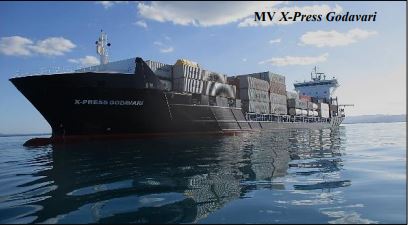Safety Alert: Lithium battery fire on board MV X-Press Godavari
This Transport Malta report into a fire in a container on the MV X-PRESS GODAVARI while anchored off India, speaks directly to a number of themes that have been firmly present on our radar and in conversations with members over many months.
It has better outcomes because there were thankfully no casualties and the vessel was secured. However, the report concludes that matters could have gone very differently in other circumstances.
Several findings of the investigation inform topics that we have discussed with members and are summarised below. Please see the full report for details.
photograph: Transport Malta report
- Li-Ion Battery fires – the probable cause of the fire was a short circuit of a lithium-ion battery, due to possible high temperatures within the container.
- Temperature Inside and Outside of the Container – the vessel departed Malaysia, on 23 September 2020. Air temperatures throughout the voyage were in the range 27℃ to 30℃. The fire occurred whilst at anchor off India (air temperature 28℃). The container was positioned on the exterior edge of the stow where it was likely exposed to direct sunlight. The Material Safety Data Sheet for the cargo in the container included measures to be taken on stowage and handling. These included storage in a cool, dry, well-ventilated place, within a temperature range of 20℃ to 30℃, and not to expose the cargo to direct sunlight for prolonged periods.
- Potential Limitations of Special Provisions/Possible need to amend the IMDG Code
- container was not declared as dangerous cargo since it was being shipped under SP 188 of the IMDG Code.
- SP 188 requires that packages be labelled with a lithium battery mark – it appears that this was done correctly – however, SP188 does not require the container, within which the packages are stowed, to be marked with the same, so the vessel’s crew were unaware of the hazards in the container.
- Importance of vessel knowing what it has on board – because crew members were unaware of the container’s contents they had to contact the charterer to obtain the information in an emergency situation. Time between spotting the fire (07:30) and knowledge of the contents becoming available to the crew (after 09:00) was not less than 90 minutes. Time between the urgent message being sent to all parties concerned (0810) and knowledge becoming available to the crew (after 09:00) was not less than 50 minutes.
- Importance of speed of response – the crew spotted the smoke early which permitted them to commence boundary cooling at an early stage.
- How do you fight a Li-Ion battery fire on board or ashore?
- the vessel had no available means to extinguish the container fire and could only apply boundary cooling
- the fire was spotted at approx. 07:30 on 28 September and was burning until at least 21:12 on 29 September
- Potential for severe consequences of a shipboard fire – the vessel’s location at the time of the fire was fortuitous in that shore assistance could also be provided to prevent the fire from spreading further and beyond control.
For full details click here
Of further interest – note 23, p9
“The MSIU and the flag State Administration discussed the possibility for the latter to present a paper to the IMO’s CCC Sub-Committee for the consideration of the proposal that all containers carrying lithium-ion batteries, are marked in accordance with the provisions of the IMDG Code, irrespective of the quantities being carried. It was eventually concluded that the proposal was not an option, because the process involves part of the industry, which is not directly linked to the flag State Administration. Moreover, the flag State Administration expressed concern on the logistical backlash, which this measure may trigger.”
We would be interested in views from members about the incident, the learning from the report and on the proposal that was not pursued at the time.
Please click here for previous Safety Alerts: https://ichca.com/safety-alerts
We are grateful to Transport Malta for providing details. We acknowledge their commitment to sharing learning to benefit others. If you have similar operations, please share this information with managers, operatives and any potentially affected third parties as appropriate. Please also review any of your relevant operations for similar hazardous conditions, risks, and controls. Learning content like this is highly valuable as it is based on real-world experience. We encourage everyone with publishable information about incidents to send it to us, so that we can raise awareness across the whole industry. Please contact us at secretariat@ichca.com; sharing your insight could save a life or prevent injury.

